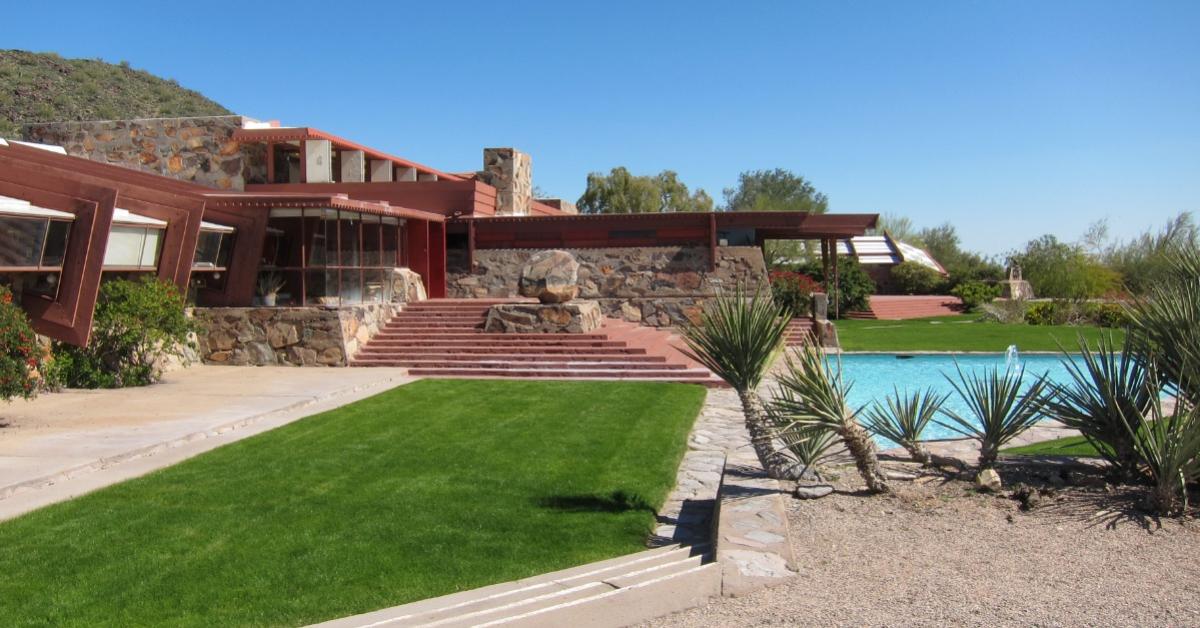
The architect Frank Lloyd Wright played an important role in the design of this beautiful desert resort. I’m sure I’m not the only person here tonight who was introduced to his work through reading Ayn Rand. His touches are plainly visible in the stonework, wooden touches, and organic approach to melding the buildings with the landscape. His style appeals to my personal aesthetic tastes and evokes something both intellectual and emotional.
Perhaps there is a lesson here about how we win, or at least how we advance. We need something more than intellectual appeal.
I suggest we have not thought enough or talked enough about beauty in our Austrian circles. Because truth and beauty are inescapably linked. Austrian economics is a beautiful logical deductive system, a way of looking at the world just as Frank Lloyd Wright had his way of looking at the world.
Consider this quote from Joe Salerno, in his great article on the sociology of the Austrian school: “The essence of Austrian economics may be defined, then, as the structure of economic theorems that is arrived at through the process of praxeological deduction, that is, through logical deduction from the reality-based action axiom.” This is quite a definition.
Austrian economics is, in other words, an edifice: a body of knowledge every bit as rooted in tangible reality as architecture. But architects consider beauty far more than economists!
Both Mises and his protégé Murray Rothbard wrote quite a lot about method, about the search for truth in economic science. But both had had precious little to say about the connection between beauty and truth, or about aesthetic sensibilities generally. In fact, a look through the indices of their biggest works shows very few references to art, architecture, or beauty more generally. We do know Mises was an aesthetic subjectivist, which we glimpse both in The Anti-capitalistic Mentality and this quote from Theory and History: “Only stilted pedants can conceive the idea that there are absolute norms to tell what is beautiful and what is not.”
Maybe Mises and Rothbard did not contemplate beauty too much because it was all around them, both in prewar Vienna and midcentury Manhattan: wonderful architecture, music, literature, theater were all just part of life.
We know Austrian economics is fundamentally true; in fact truth is its most important and fundamental responsibility. Yet we cannot afford to ignore the corollary to truth, namely beauty. Without beauty, divorced of any higher human longings, economics devolves from a beautiful theoretical edifice into a bastard cousin of accounting and finance, a business discipline. Or even worse, it becomes nothing more than an intellectual veneer for so-called public policy, which is really just sanitized euphemism for politics.
Is economics really bloodless, or does it have a soul? Can it serve beauty and truth?
Progressives abandoned beauty a long time ago, in fact they promote and advance ugliness as a matter of principle—while attacking even the idea of truth. Some conservatives at least give lip service to the importance of beauty; I’m speaking of the Roger Scrutons and Douglas Murrays and Trad Catholics. They at least see it as worthy of consideration. But the Heritages and Claremonts and National Reviews are too busy defining themselves as: Not progressive. They are mired in policy and can’t seem to explain markets and capital and ownership in human terms which resonate. And even the best conservatives (our friends Paul Gottfried and those at Chronicles magazine are exceptions) tend to be mired in faulty economics and delusions of statecraft. They don’t have truth.
The writer Steve Sailer recently showed a collection of US city hall buildings constructed before and after 1945, which he identifies as dividing year in architecture. “Before then,” Sailer says, “Westerners tried, in many different styles, to make buildings look beautiful. After 1945, they felt like they didn’t deserve beautiful buildings.”
Of course the older city halls, especially those from the 1800s, evoked European classical and neoclassical architecture. Those built in the 1960s and ’70s tended to be brutalist monstrosities of concrete and glass—deliberately ugly, we can only assume, and plainly dehumanizing.
Why in the world are economists not noticing this? Austrians understand fiat money, but what about fiat architecture, fiat food, fiat art, fiat culture, fiat everything? Economics does not somehow stand separate and apart from the cultural ramifications of our disastrous economic policies. It is here to help us make sense of the ugliness growing around us, and not just in politics.
Beauty without Truth?
There is no doubt: The hunger for beauty in the West today is real. We are starved for it.
I’m sure many of you watched the events surrounding Queen Elizabeth’s death and funeral. There was plenty of distinctly English pomp & circumstance and marching—one thing the old empire still does well! They could sure use some of that precision over at the National Health Service.
But what pulled us in was the sheer spectacle of it all. We witnessed reverence, even veneration, for tradition, country, for a figurehead, for a hereditary monarch!
We saw beautiful buildings, robed clergy conducting religious ceremonies in majestic cathedrals (though they brought in plenty of vaguely nondenominational speakers at the funeral, along with a cameo by the dreadful Liz Truss), and open religiosity in 2022. Not to mention plenty of men in military dress, order, precision, and appeals to continuity. Everything progressives hate!
And yet it was all somehow hollow. It felt more like an end than a beginning. Nobody is excited for the prospects of “King Charles III,” who of course is a woke crazed environmentalist who literally praised the Great Reset in a speech to the World Economic Forum. His sons are cut from the same cloth, and due to tabloid and social media we know all their personal foibles and see them in a very different light than the departed Elizabeth. They are unserious people.
It all felt like beauty without truth or substance, like an empty pageant or a museum display. And it was made worse by the clownish Biden stumbling around and the nauseating BBC commentary.
But there was something there, a hunger for seriousness and substance and meaning. Whether the Queen and the faltering monarchy provided this is dubious, and whether Charles and Co. can is even more dubious. But millions of people were out on the streets of London and millions around the world watched on television. I suggest they were looking for beauty.
Modern elites are not up to the task. They cannot satisfy this hunger because they are ugly at their core. But here is the good news: at no point in modern history, at least in the West, they been less impressive and more vulnerable. They are deeply unserious people: the Blairs and the Borises, the Klaus Schwabs, the Zuckerbergs and Bezos, the Pelosis and Squads and Bidens and Bushes and Clintons and Cheneys; the sociology professors and the pop stars and moronic “influencers” and useless Twitter pundits.
Our elites don’t care about truth and beauty. They possess neither, they demonstrate neither, nor see neither as worthwhile. They care about power, status, and money.
But we can replace them, and we must.
We Need New Elites
Every society needs elites; the question is always whether they are natural or imposed, whether they earned their wealth and position in society or captured it through state connections. But we must expect this. Rule by elites, at least to an extent, is indeed inevitable. Every society, across time and across place, manifests this. Democracy doesn’t solve or change it, but merely transfers status away from merit and natural authority toward politics and cronyism.
Political and economic liberty is about the freedom and prosperity average people enjoy in any society. This should be our focus. In the poorest and most corrupt countries, elites fatten their own Swiss bank accounts while parasitically draining citizens of their meager resources. In the wealthiest and least corrupt countries, elites act far more benevolently (I submit Prince Hans-Adam II of Liechtenstein as a benevolent example). Most countries across the West today lie somewhere in the middle.
How do we identify “good” elites, wise leaders who will act and guide the world in benevolent ways? Leaders who care about civilization, property, prosperity, peace, justice, fairness, conservation, and charity?
We start by turning our backs on politics, media, academia, and popular culture and recognizing the real-world examples around us. Then simply look around you. In our family, work, social circles, and local communities are the men and women who can replace our very unnatural overlords. Men and women who understand inequality and human differences as the inescapable starting point for human society. Or as Mises said, we need “collaboration of the more talented, more able, and more industrious with the less talented, less able, and less industrious,” which “results in benefits for both.”
Progressives of all political stripes oppose the idea of natural elites not because of their claimed egalitarianism or democratic impulses or dislike of hierarchies: they oppose the idea because it contemplates a hierarchy not established by them, a hierarchy where they are not at the top. A natural elite also means that intelligence, ability, attractiveness, charisma, wisdom, discretion, and quiet confidence—all very unequally distributed in nature—become the characteristics of those holding greater influence in society.
We have a responsibility to be the actual “adults in the room.” We desperately need to desanctify the current crop and replace them with much better and nobler people.
It Is Up to Us
None of this is easy. And it comes with a heavy price, to be paid by all of us.
Most of us want to focus on our families, our personal lives, our business or professional lives. We want to take care of our own. We don’t see ourselves as leaders, certainly not as radicals or revolutionaries. We are not wired for constant agitation and, or else we would be progressives. And we certainly don’t want to live political lives.
Richard Hanania, a name some of you might know, did some research and published an interesting article in 2021 titled “Why Is Everything Liberal?” By which he meant: How did progressive come to control all of our institutions? And in his view, it all comes down to cardinal preferences: The Left cares more, and wants it more. They are far more willing to engage politically, to donate, to agitate, to choose college majors and seek jobs in academia or media or NGOs or HR departments for influence rather than building businesses for money.
In this sense our natural modesty, our live and let live attitude, our inclination to tend to our own, does us no favors.
In 2003 Lew Rockwell gave a talk at the Mises Institute titled “The Path to Victory.” I know some of you were in that room. He argued against quietism, against retreat, against accelerationism, against attempting to capture lost institutions like academia and Congress and mainstream media. He argued instead for robust adherence to truth, to education, to using every available platform, and to recognizing that influence can be indirect and far off temporally. Success, he said, can take many forms and change can happen very suddenly.
Understand this: our personal happiness or self-actualization is not the focus here. Action is not ease or contentment, in fact it happens because of what Mises termed “felt uneasiness.” Contentment, as opposed to happiness, comes from serving others—as our own Bob Luddy so eloquently explains in his writing about entrepreneurship.
Mises has this zesty quote about happiness near the beginning of Human Action, and I’ll apologize in advance to any Buddhists in the audience:
Some philosophies advise men to seek as the ultimate end of conduct the complete renunciation of any action. They look upon life as an absolute evil full of pain, suffering, and anguish, and apodictically deny that any purposeful human effort can render it tolerable. Happiness can be attained only by complete extinction of consciousness, volition, and life. The only way toward bliss and salvation is to become perfectly passive, indifferent, and inert like the plants. The sovereign good is the abandonment of thinking and acting.
Such is the essence of the teachings of various Indian philosophies, especially of Buddhism, and of Schopenhauer.
The subject matter of praxeology is human action. It deals with acting man, not with man transformed into a plant and reduced to a merely vegetative existence.
So we need volition, what Mises like to call our natural “élan vital,” or life force. Let us not be vegetative!
Conclusion
There is a dangerous hubris, a conceit, in imagining we live in particularly dangerous or troubled times, or times of intense and unprecedented rapid change. Relatively speaking, I’m not sure we do.
Consider the lifetime of Ludwig von Mises, who died nearly fifty years ago, in October 1973. Remarkably, in a roundabout way, he is the reason we are all together tonight.
In his time, coming from a village in what is Ukraine today, he was able to live and work in prewar Vienna—one of the most beautiful places and times in western history. It was a high point for intellectualism, for architecture, for classical music, a crossroads for productive and dazzling thinkers. Beauty was all around him.
But Mises also saw tremendous ugliness. He saw his beloved Vienna fall to the barbarism of Weimar and hyperinflation. He saw two incredibly destructive World Wars ravage Europe. He saw Leninism and Stalinism; Nazism and Italian fascism, Wilsonianism and FDR’s New Deal, and the development of nuclear weapons. He was forced to flee war twice. He saw socialism and Keynesianism take over academic economics as “scientific.” His saw his own career interrupted, as he had no choice but to leave for America and a very uncertain future—while learning a new language in his fifties.
Along the way he saw the world go from outdoor plumbing and kerosene lamps to widespread electricity. He saw newspapers yield to radio and television. He saw the world go from horse and buggy to automobiles, from the earliest propeller planes to jets to space travel and satellites. He saw communication go from telegrams to radio to television to the earliest internet. He truly lived through enough changes for ten lifetimes.
So we can hardly claim to live in more perilous or rapidly changing times than Mises!
To conclude:
We win by serving truth, but also beauty. We cannot separate the two or have one without the other.
We win by placing economics squarely at the vital center of understanding all human social cooperation, a discipline that helps us understand the beauty of that cooperation and the ugliness of state power.
We win with a focus on the long term, not the short run.
We win by building better elites and better institutions.
We win by going out unapologetically and forcefully into the world.
Did you see the British SAS soldiers at the aforementioned Queen’s funeral? Their motto is: Who Dares Wins. The future belongs to confident people. Let that be us.





